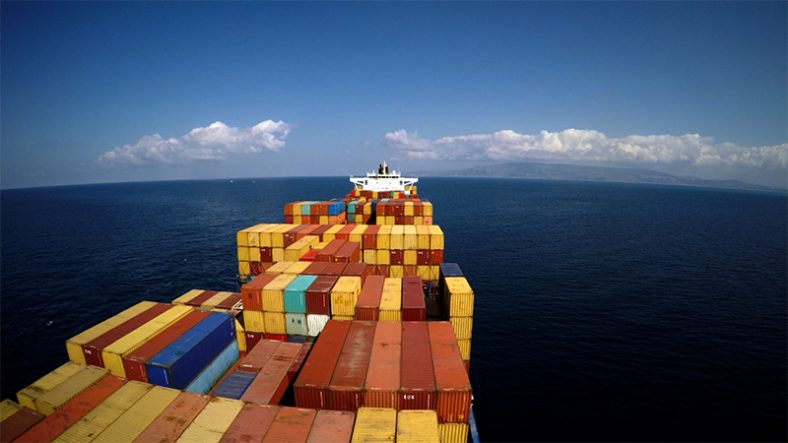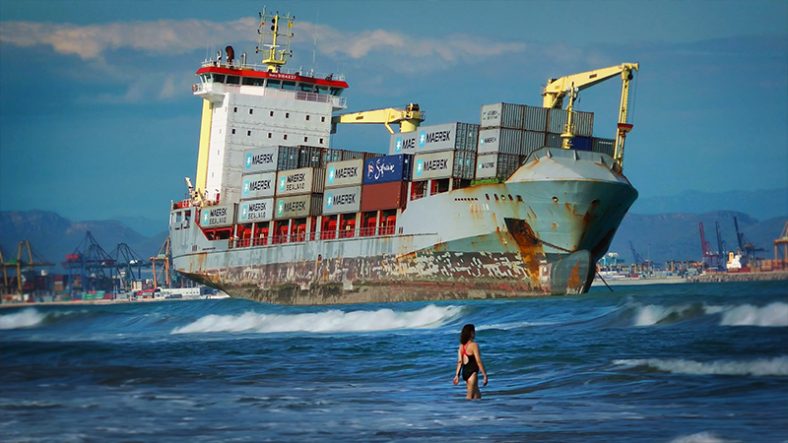FREIGHTENED – The Real Price of Shipping is a 2016 documentary, revealing an investigation about the many faces and contradictions of massive shipping and sheds light on the consequences of an all-but-visible industry.

Aerial shot of the Puelche container ship
9 out of 10 products consumed today in the Western world come from over seas. This has created a disturbing paradox: buying a product manufactured in a far-off country is often cheaper than purchasing goods made within reach of terrestrial transport. The true backbone of today’s globalised economy is the sea freight apparatus, an armada of gigantic vessels, that yet remains largely obscure to many. Due to their size, freight ships no longer fit into traditional city harbours and so, they have moved away, out of the public’s eye. Only few people are aware that this entire industry is owned by few magnates, having influence on the world’s economy and even on governments. The documentary investigates the mechanics and risks of world-wide freight shipping to discover how this industry has ended up holding the key to our economy, our environment and the very model of our civilisation. The revolutionary invention of the container boosted the freight shipping industry converting it into one of the most lucrative businesses in the world today with 60 thousands vessels constantly sailing seas.

Swimmers share the beach with a rusty container ship
In our consumer-based society, everything is attainable in a short time period. Most likely, the products that we purchase are assembled in different places across oceans. The whole world is seen as a single factory; different tasks can be completed in different places where manufacturing costs are low. One of the consequences of this model is the exploitation of labour forces in emerging countries beside being one of the most dangerous pollution sources of the planet. It is calculated that the 20 largest vessels pump more sulphur into the atmosphere than all the billions cars on the planet. Unfortunately neither the Kyoto Protocol, nor the COP 21 climate agreement, mention “shipping” in any way or form. The IMO (International Maritime Organisation) is slowly taking steps to limit pollution from ships in northern Europe and parts of North America. But enforcing the regulation is proving problematic for member states as, rather unusually for a United Nation organisation, the IMO is funded by its’ member governments. The highest contributor to the IMO budget is Panama, followed by Liberia and the Marshall Islands, the three biggest fleets in the world. These countries sell their national flag to shipping companies so they can maximise profits by escaping tax and home territory labour regulations. The illegal practices of the freight shipping industry have enabled subversive economies to exist, only 2% of the million containers transiting the world’s shipping lanes is scanned or inspected by customs, turning them into an ideal means of conveyance for arm traders, drug traffickers and illegal immigration networks.

Philippine recruiters on the streets of Manila
This industry is, on the other end, highly necessary to fulfill the ever-increasing demands of our society, as it has become the most efficient and cost-effective means of transporting goods. Changes in this sector would require fundamental shifts in the foundations of our economical and social model. The documentary show also some of the different initiatives that are proving to be effective and economically viable. Alternatives such as wind power, which combined with other existing innovations, can reduce a ship’s fuel consumption by 30 to 40%. Other initiatives such as the online platform “ShippingEfficiency.org” launched by the NGO, The Carbon War Room and RightShip helps to increase information flows and transparency around the efficiency of the international shipping fleet. The ability to access accurate, transparent and timely information helps to generate a more efficient shipping industry and engages the buyers in a better practice of consumption. Nevertheless there are still big improvements to be done and compromises to be taken; policy-makers and institutions should take a firm stand to reform this industry and guide it towards better practices, so that shipping can become a true driver of growth that does not leave anybody on the wayside.
Source: https://www.freightened.com/

